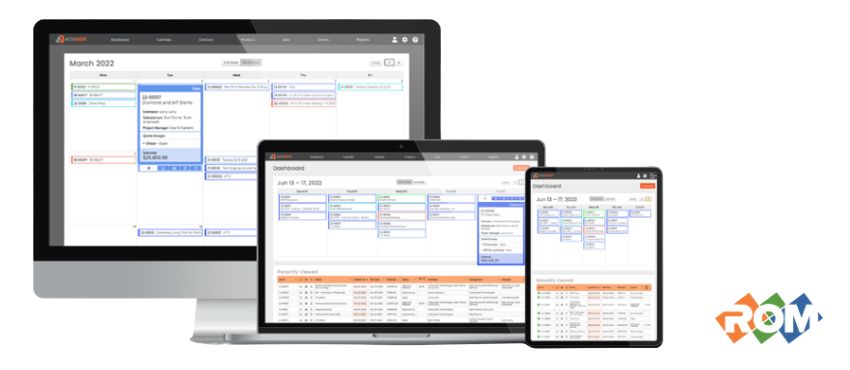In the dynamic world of manufacturing sales, the role of manufacturer representatives (reps) is pivotal. Central to their success is the concept of Quotation Management, a critical process that involves creating, sending, and tracking quotes for products or services.
For manufacturer reps, efficient quotation management is not just a clerical task; it’s a strategic function that directly impacts sales performance and customer relationships. The essence of quotation management lies in its ability to provide accurate and timely price estimates to potential buyers.
This process is crucial for manufacturer reps as it sets the stage for negotiations, influences purchasing decisions, and ultimately drives revenue. In a competitive market, the agility and precision of this process can be the difference between closing a deal and losing it to a competitor.
Understanding the Challenges in Quotation Management for Manufacturer Reps
Despite its importance, many manufacturer reps face significant hurdles in their quotation processes. Traditional methods, often reliant on manual inputs and spreadsheet-based systems, present a host of challenges:
- Time-Consuming Processes: Manual quotation creation is labor-intensive and time-consuming. Manufacturer reps spend considerable time gathering data, which could be used more effectively in engaging with clients and pursuing new leads.
- Error-Prone Calculations: Spreadsheets, while versatile, are prone to human error. A simple mistake in data entry or formula can lead to incorrect pricing, potentially resulting in financial losses or damaged client relationships.
- Lack of Real-Time Data: Traditional methods often fail to integrate real-time data, leading to quotes that don’t reflect current market conditions, inventory levels, or cost fluctuations.
- Inefficient Tracking and Follow-Up: Without a centralized system, tracking the status of multiple quotes and performing timely follow-ups becomes a logistical nightmare, often leading to missed opportunities.
- Scalability Issues: As businesses grow, managing an increasing volume of quotes through manual methods becomes unsustainable, hindering the ability to scale operations effectively.
In the next sections, we will delve deeper into how technology is revolutionizing this domain, the role of CRM and CPQ tools, and best practices for overcoming these challenges.

The Role of Technology in Enhancing Quotation Management
In the realm of quotation management for manufacturer reps, technology has emerged as a game-changer. The advent of advanced tools like Customer Relationship Management (CRM) and Configure, Price, Quote (CPQ) software has revolutionized the way quotations are managed, bringing a new level of efficiency and accuracy to the process.
Transforming Quotation Management with CRM and CPQ Software
1. Streamlining Processes with CRM: CRM systems have become indispensable in managing customer relationships and sales processes. In the context of quotation management, CRM tools offer a centralized database that stores all customer information, past interactions, and sales history.
This integration allows manufacturer reps to create personalized and informed quotes, enhancing the customer experience.
2. Configuring Accurate Quotes with CPQ: CPQ software takes quotation management to the next level. It allows manufacturer reps to quickly configure products or services according to customer requirements, accurately price them, and generate quotes in real time.
This software often includes guided selling features, ensuring that reps propose the most suitable solutions and adhere to company pricing policies and discount rules.
Benefits of Automation and Real-Time Data
- Reduced Errors and Increased Efficiency: Automation minimizes manual data entry, significantly reducing the likelihood of errors. Automated systems ensure that quotes are generated with the correct pricing, discounts, and configurations, leading to a more efficient quotation process.
- Real-Time Data Integration: One of the most significant advantages of modern quotation management tools is their ability to integrate real-time data. This integration includes up-to-date pricing, inventory levels, and lead times, ensuring that quotes are always accurate and relevant.
- Faster Response Times: In today’s fast-paced market, speed is crucial. Automated tools enable manufacturer reps to respond to quote requests much faster than traditional methods. This rapid response time can be a critical factor in winning business.
- Enhanced Customer Experience: By leveraging CRM and CPQ tools, manufacturer reps can provide a more personalized and engaging experience to their clients. Tailored quotes that address specific customer needs and preferences demonstrate a higher level of customer service and understanding.
- Scalability and Growth: As businesses grow, the volume of quotes and the complexity of deals increase. Technology enables scalability, allowing manufacturer reps to manage a larger volume of quotes without compromising on accuracy or efficiency.
The integration of CRM and CPQ software in quotation management is not just an upgrade; it’s a transformation that empowers manufacturer reps to be more accurate, efficient, and customer-centric.

ROM’s Approach to Quotation Management
In the landscape of quotation management solutions, Rep Order Management (ROM) stands out with its specialized suite of tools designed to cater specifically to the needs of manufacturer reps. ROM’s platform is a testament to how technology can be tailored to address industry-specific challenges, streamlining the quotation process and enhancing overall sales efficiency.
Key Features of ROM’s Quotation Management Tools
1. Bid Calendar
ROM’s bid calendar is a strategic tool that provides a comprehensive view of all ongoing and upcoming bids. This feature allows manufacturer reps to track deadlines, manage priorities, and ensure timely responses to quote requests. The visual and interactive nature of the bid calendar simplifies the management of multiple quotes, ensuring no opportunity is missed.
2. Quote Builder
The quote builder is a cornerstone feature of ROM’s platform, enabling reps to create detailed and accurate quotes efficiently. This tool allows for the customization of quotes, ensuring they align with specific customer requirements and preferences. The ability to reuse and modify existing quotes further enhances productivity and consistency in the quotation process.
3. Integrated Ordering System
ROM integrates the quotation process with order creation, ensuring a seamless transition from quote to order. This integration minimizes the need for rekeying information, reducing errors and saving valuable time. The system’s ability to track real-time financials for each order provides manufacturer reps with critical insights into their sales performance.
ROM’s Tailored Approach for Manufacturer Reps
ROM’s platform is designed with a deep understanding of the unique challenges and requirements faced by manufacturer reps. The tools are developed to:
- Enhance collaboration among team members, regardless of their location.
- Provide real-time data and analytics for informed decision-making.
- Streamline the entire sales cycle from quotation to order fulfillment.
- Increased visibility across multiple locations and sales teams
Best Practices for Manufacturer Reps
To maximize the benefits of tools like ROM and improve their overall quotation process, manufacturer reps should consider the following best practices:
- Understand Customer Needs: Deeply understanding customer needs is crucial. This understanding allows reps to create quotes that are not only accurate but also tailored to address specific pain points and requirements of the customers.
- Ensure Accurate Pricing: Accurate pricing is the backbone of effective quotation management. Manufacturer reps should leverage real-time data and analytics to ensure their quotes reflect current market conditions and cost structures.
- Efficient Follow-Ups: Timely and efficient follow-ups after sending a quote can significantly increase the chances of winning the bid. Manufacturer reps should establish a systematic follow-up process, leveraging tools like ROM’s bid calendar and automatic email notifications to keep track of all quotations.
- Leverage Technology for Efficiency: Embracing technological solutions like ROM can dramatically improve the efficiency and accuracy of the quotation process. Manufacturer reps should continually seek to integrate new tools and technologies that align with their business processes and customer needs.
- Continuous Learning and Adaptation: The market is ever-evolving, and so are customer expectations. Manufacturer reps should stay informed about industry trends and be willing to adapt their quotation strategies accordingly.
By combining the power of specialized tools like ROM with these best practices, manufacturer reps can significantly enhance their quotation management process. This combination leads to improved sales performance and customer satisfaction.

The Future of Quotation Management
As we look toward the horizon of quotation management, it’s clear that the field is poised for transformative changes, especially for manufacturer reps. The future is intricately linked with the advancements in emerging technologies like Artificial Intelligence (AI) and Machine Learning (ML).
Emerging Trends in Quotation Management
- AI-Driven Personalization: AI is set to revolutionize quotation management by enabling highly personalized quotes. AI algorithms can analyze customer data and previous interactions to suggest optimal product configurations and pricing, making each quote more relevant and appealing to the individual customer.
- Predictive Analytics: The integration of predictive analytics in quotation tools will allow manufacturer reps to forecast market trends, customer buying patterns, and pricing dynamics. This foresight will enable more strategic quoting, aligning with future market conditions.
- Automated Real-Time Adjustments: With ML algorithms, quotation systems will be able to adjust quotes in real time based on fluctuating variables such as material costs, labor, and logistics. This will ensure that quotes are always competitive and profitable.
- Enhanced Efficiency with Chatbots and Virtual Assistants: The use of chatbots and virtual assistants for initial customer interactions and basic quote generation will streamline the quotation process, allowing manufacturer reps to focus on more complex tasks and customer relationships.
- Blockchain for Secure and Transparent Quotations: Blockchain technology could be employed to create immutable records of quotes and transactions, enhancing transparency and trust between manufacturer reps and their clients.
Conclusion
Throughout this article, we have explored the critical role of quotation management in the success of manufacturer reps. From understanding the challenges in traditional methods to the revolutionary impact of CRM and CPQ software like ROM, it’s evident that efficient quotation management is a key driver of business growth. The future, promises even more sophisticated solutions, further enhancing the accuracy, personalization, and efficiency of the quotation process.
For Man Reps looking to stay competitive
For manufacturer reps looking to stay competitive and achieve sustained growth, embracing modern quotation management solutions is not just an option; it’s a necessity.
Investigate platforms like ROM, which are specifically designed to streamline and enhance the quotation process. By adopting these innovative solutions, you can ensure that your business remains at the forefront of efficiency and customer satisfaction.
FAQs
Quotes are crucial in sales as they provide a detailed outline of the products or services offered, along with their prices. They serve as a formal offer for sale and set clear expectations for both the buyer and the seller. Effective quotes can help in building trust, clarifying the terms of the sale, and facilitating the decision-making process for potential customers.
In business, a quote is important as it represents a commitment to a specific price for goods or services. It helps in setting clear financial expectations and aids in the financial planning of both the business and the customer. Accurate quoting is key to maintaining profitability, building customer trust, and enhancing the reputation of the business.
In manufacturing, a quote refers to a document or statement that specifies the cost of producing a particular item or providing a service. It includes details such as material costs, labor, overheads, and profit margins. A well-prepared quote in manufacturing is crucial for winning contracts, maintaining cost-effectiveness, and ensuring smooth production planning.
